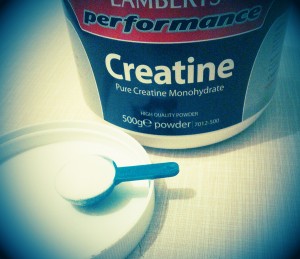 Few dietary supplements are able to claim ‘drug-like’ improvements in body composition or athletic performance. However, evidence shows that creatine monohydrate offers the potential for rapid gains in strength and lean mass in a relatively short time period. Supplementation with creatine monohydrate powder increases the phosphocreatine concentration in skeletal muscle, and this effect is particularly apparent in the fast twitch type II fibres. The rise in phosphocreatine concentration increases the water content of the muscle cells and this causes an increase in lean mass that can equate to several pounds of weight in a typical male. Phosphocreatine is used by skeletal muscle to buffer ATP hydrolysis during bouts of high intensity exercise. Creatine is therefore most beneficial to athletes who require short bursts of high intensity activity, such gymnasts, sprinters and weight lifters. Those with lower pre-supplementation phosphocreatine levels, such as vegetarians, tend to show the biggest improvements with creatine supplementation.
Few dietary supplements are able to claim ‘drug-like’ improvements in body composition or athletic performance. However, evidence shows that creatine monohydrate offers the potential for rapid gains in strength and lean mass in a relatively short time period. Supplementation with creatine monohydrate powder increases the phosphocreatine concentration in skeletal muscle, and this effect is particularly apparent in the fast twitch type II fibres. The rise in phosphocreatine concentration increases the water content of the muscle cells and this causes an increase in lean mass that can equate to several pounds of weight in a typical male. Phosphocreatine is used by skeletal muscle to buffer ATP hydrolysis during bouts of high intensity exercise. Creatine is therefore most beneficial to athletes who require short bursts of high intensity activity, such gymnasts, sprinters and weight lifters. Those with lower pre-supplementation phosphocreatine levels, such as vegetarians, tend to show the biggest improvements with creatine supplementation.
Those with lower pre-supplementation phosphocreatine levels, such as vegetarians, tend to show the biggest improvements with creatine supplementation. In addition some people respond to pure creatine monohydrate powder less than others. Early work on creatine supplementation was performed at Nottingham University under the auspices of Paul Greenhaff1. The early experiments identified two groups, responders and non-responders. The responders would show increased creatine uptake with supplementation and this would translate into improvements in strength and power. However, the non-responders did not shows these effects. Subsequent analysis and experimentation revealed that some individuals require concomitant glucose ingestion with creatine in order to benefit. This may relate to the effects of insulin which is required to shuttle the creatine into skeletal muscle.
